'All Eyez on Me' Writers on What Guided Their Choices in Presenting Tupac Shakur's Life Story
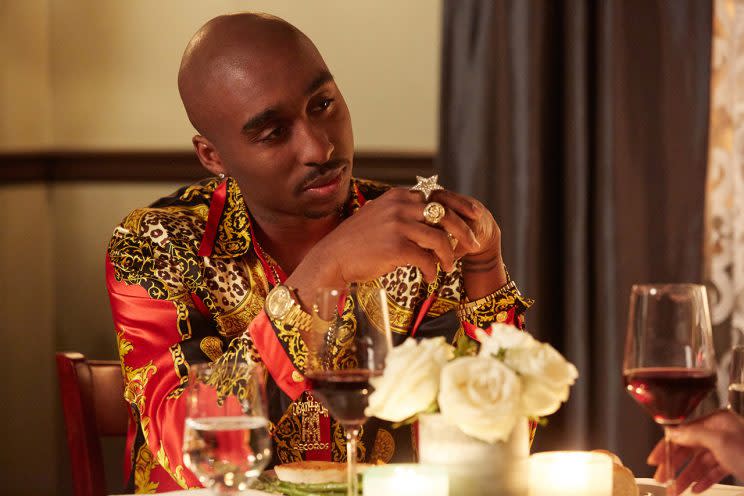
By any measure, Tupac Shakur lived a rich, if sadly shortened, life. The sheer eventfulness packed into his 25 years is a biographer’s dream, but a biopic screenwriter’s potential nightmare. With so many incidents to chronicle, how could they possibly fit within a conventional feature film runtime? The choice of what to leave in, and what to leave out, of the long-awaited Tupac biopic, All Eyez on Me, fell to Eddie Gonzalez and Jeremy Haft, the screenwriting team credited on the film along with Steven Bagatourian. In the expansive interview with Yahoo Movies below conducted earlier this month, the duo discussed dramatizing Shakur’s life — including controversial moments such as his trial and conviction for sexual assault — and the next hip-hop biopic they’d like to see made.
As I understand it, All Eyez on Me was something of a dream project for both of you. How did you get involved and shape this life story into a narrative feature?
Eddie Gonzalez: I was born in Compton, and grew up in the neighboring city, Lynwood, as a huge hip-hop fan. I’d buy CDs out of the trunks of cars, and I loved Public Enemy, N.W.A, and, of course, Tupac. Jeremy wasn’t as rabid a fan as I was, and that was actually one of the best things for the two of us and for the story. We had two different points of view that could coalesce into making what this movie became. Or, one of us could focus on the minutiae of things, like the Makaveli album, and Jeremy would say, ‘Okay, how will the audience understand this?’ We had to make this as accessible as possible without shortchanging the story.
Jeremy Haft: Eddie had the inside baseball view, because he lived in Compton and grew up seeing more of the stuff that Tupac would see: police oppression, drugs in the community, and poverty. He dealt with that on a one-on-one, so he can viscerally talk about it, feel it, and describe it. Like Eddie said, I was able to take a bigger picture view of, ‘How do we appeal to the average casual fan?’ So we melded both our thoughts into one coherent narrative.
I’d say the other really important thing is that when we came in to meet [producers] LT Hutton and David Robinson, we said, ‘Listen, everybody knows Death Row, everyone knows ‘California Love‘, everyone knows the Digital Underground and everyone knows the fights with Biggie [Smalls, a.k.a., Christopher Wallace or The Notorious B.I.G.] Everyone knows those huge milestones, but Tupac had so many sides to him, so many dimensions. What made Tupac Tupac?’ We wanted to go back to the beginning and show Tupac as a child, Tupac at adolescence, and how that formed him. Why is he the man that he became? That was the most important thing to us, showing how he grew up. His mom, Afeni, was a Black Panther, and part of the Panther 21. She was a community activist, a social activist, and she pushed Tupac to be educated and socially conscious, so he grew up in a really interesting and different environment and a lot of people don’t know that.
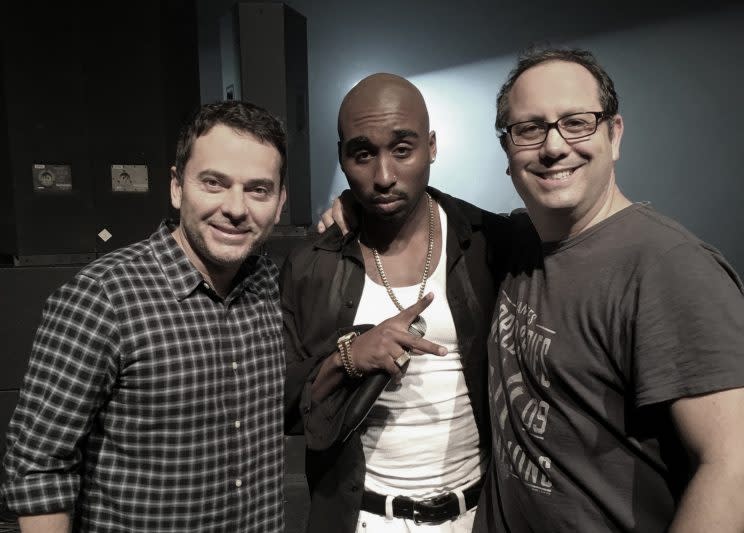
Sometimes it feels like the most successful biopics, especially musical biopics, telescope the narrative to focus on one incident or formative moment. It can be harder to pull off pillar-to-post stories. Are there versions of the script where you zeroed in one incident versus going for a bigger picture approach?
Gonzalez: I don’t think so. This was pretty much the way we wanted to go. Everybody knows that Tupac died in Vegas, but just for a minute — maybe 15 minutes or a half-hour — we wanted you to forget about that, and show this frenetic roller-coaster life so you go, ‘Oh my God, maybe he’s not going to die!’ So the goal was definitely not to telescope, it was to take you on this journey of his life.
Haft: Were there versions where we spent another 20 minutes in Death Row? Yeah. Were there versions that we spent 20 more minutes in Baltimore? Absolutely. But at the end of the day, he did so much in such a short period of time that it was important to show all of it. You could’ve started with him joining the Digital Underground, and going ‘Man, back when I was a kid, it sure was crazy…’ But his adolescence and his childhood was so important to the man that he became, so we needed to spend that 15 or 20 minutes there.
Last year, we had two movies about Barack Obama that focused on his early years: Barry and Southside With You. Was there any thought of just doing a “Young Tupac” movie?
Gonzalez: No, I don’t think that was ever discussed in our meetings with the producers. The funny thing is, everyone always said this could be a two-part film or a miniseries! The hardest part was trying to cut down things, and I’m sure there are going to be people who see the movie and say, ‘Oh, I wish they’d spent more time at Death Row!’ We completely understand that, but there’s only so much time to show everything, so we tried to hit the moments that made the most sense for the storytelling and for people to get an idea of who he was.
The other issue confronting biopics is who owns the rights to the life story. Is this an approved version of his life?
Haft: We’re not attorneys or the producers, so we weren’t involved in obtaining the rights, but Morgan Creek, the production company, acquired the rights from Afeni Shakur, who has the estate, a bunch of years ago, before us.
Gonzalez: Obviously, the movie has the real music. There may have been a point where they said, ‘We can’t use that song,’ because clearing music rights is very difficult. But there was nothing we lost where we felt like, ‘This really affects the story.’
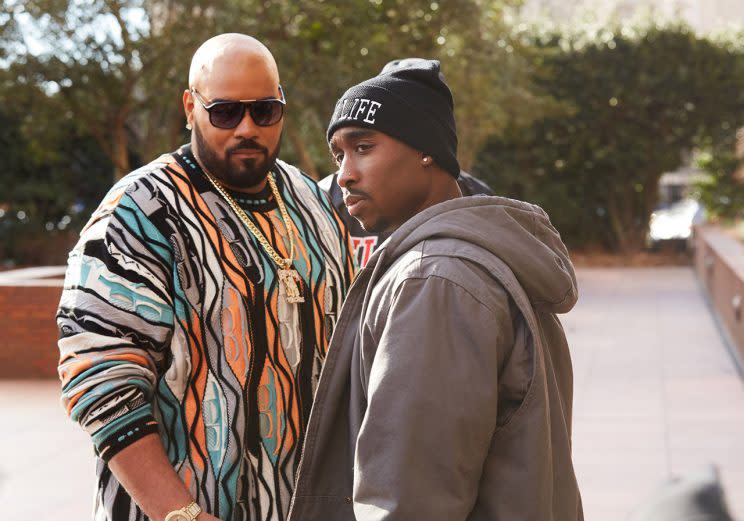
Since the rights were acquired awhile ago, do you know why it took so long to come to fruition?
Haft: There were a bunch of writers before us. I’ve never actually met any of them, but obviously I’d seen their names. It really comes down to corralling the story. LT Hutton worked at Death Row and was friends with Tupac. He is the engine on this movie, because he’s the one that has to go back to friends and family of Tupac, friends and family that were at Death Row, and say, ‘This is the movie I made.’ So I think he, more than anyone, wasn’t gonna let this movie get made until he felt like it was the right movie. I can’t speak to the other drafts, because I wasn’t involved in them, but until Eddie and I started writing, I guess they didn’t feel that they had the right story and the right Tupac.
Obviously, a lot of the players in this story have passed on, while others are still alive. How does that affect the way you write the characters who are living, and that people know well? How does that affect how you create their dramatic counterparts?
Gonzalez: Either living or dead, first and foremost we want to portray them accurately. We didn’t want to create caricatures of people, and we didn’t want to lie about anybody. It just wouldn’t be the right thing to do. I think that everyone is accurately portrayed in the film and, again, it was just one of those things where you want to make the best story possible and you want to make sure that there’s truth and storytelling, and I think that’s been here.
Haft: Another shout out to LT, he knew friends of friends of all these people so I think his whole point is, ‘We’re gonna tell the true real story, warts and all, for everybody.’ And that included Tupac. We weren’t making the ‘Movie of the Week’ version where Tupac is perfect and never makes a mistake. It was important to show all his sides, and I think that goes to all the other characters as well. Let’s be honest and real, and show what the real struggle was.
To that point, there are a few specific storylines where I’m curious how things were dramatized. I’m not a Tupac expert by any means, but I’m interested in how you made certain dramatic choices for the script. Going to his sexual assault trial, you’re dealing, as dramatists, with two different accounts of what happened. It seems like the movie presents his side as being innocent. What were your thoughts in terms of dramatizing that, knowing there were two accounts?
Haft: Throughout the movie, we always said, and LT always said, ‘Tupac has already told his story.’ Read [his poetry collection] The Rose That Grew from the Concrete, watch his interviews on YouTube. He’s already told his story, so throughout the movie, there are numerous times that we used that to create dialogue. His thing outside the courtroom, ‘Why am I being accused just because I’m Tupac?’ That’s real dialogue. So the incident at the hotel, we generally told it from Tupac’s POV, but at the same time we wanted to leave it a little bit ambiguous so that the audience could make a leap on their own as well. I think that we portrayed how Tupac explained the situation, and to a large degree how the woman viewed the situation, but we left it up the audience to imagine what happened. But the reality is, none of us were there.
Was it difficult to discuss sensitive topics like that with Hutton or with Tupac’s mother?
Gonzalez: I don’t think it was difficult with LT; there was never any subject that was off-limits in talking to him. But again, as Jeremy mentioned, the guiding principle was, ‘Tupac has already written his story.’ During that trial, when he says to the judge, ‘You already have this perspective of me, you’ve never once looked at me. So do as you may with me because I’m not in your hands, I’m in God’s hands.’ Those are Tupac’s words, so the conversations that we would have with LT and the other producers were just, ‘Look at the research, look at what he said,’ and that was the guiding principle in those themes. We didn’t have to dramatize them. It wasn’t hard to say the audience gasped. The audience actually cried when he said that, in the jury gallery. Those are just things that were taken from real life and put on there.
One of the contradictions with Tupac that you address in interesting ways is the fact that some of his songs seem to be misogynistic, and yet you also present him giving money to a woman living in her car. Dramatically, what choices did you made to present both sides of him?
Gonzalez: It speaks to a three-dimensional character. I may say one thing now and do another thing later. I think it’s just a human [trait], and in Tupac’s case, what’s most interesting is that this guy loves women. When you listen to ‘Keep Ya Head Up,’ ‘Dear Mama,’ or ‘Brenda’s Got a Baby,’ those songs are about women. The biggest influence in his life was his mother. I think people forget how much he loved women and he spoke about them in his songs and in his actions. So it wasn’t a challenge doing both things because that’s who he was. I think it would have been a challenge if we had to create some artificial thing to go, ‘How are we gonna show that he likes women?’ It’s not that difficult — he loves women.
Haft: We cast very strong women to play his mom (Danai Gurira), his fiancée, Kidada Jones (Annie Ilonzeh) and his friend, Jada Pinkett (Kat Graham). I think they’re portrayed as intelligent and strong in the movie.
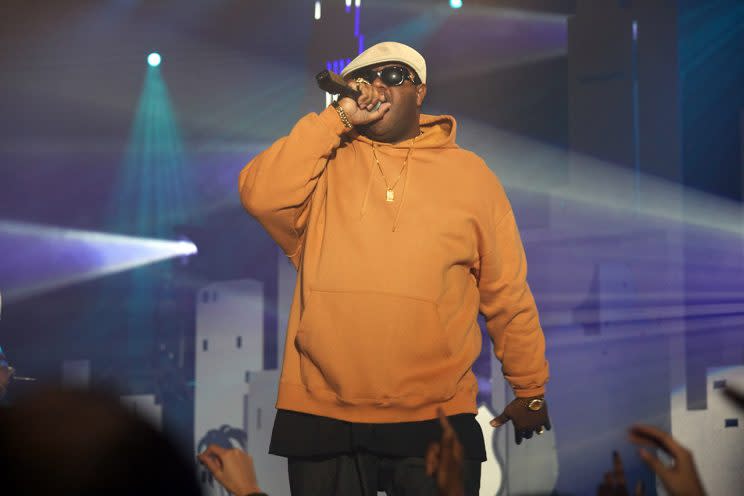
In terms of the Biggie and Tupac relationship, there’s been a lot of speculation over the years as to how it may or may not have contributed to his death. There’s a scene in the movie where Biggie goes to visit Tupac in the hospital after he’s been shot, and is turned away. It’s intimated that their rift begins there. How did you dramatize that relationship in particular?
Gonzalez: What was interesting about that hospital scene is that’s one of those things I did not know before. I didn’t know that Biggie had gone to visit him at the hospital. You can definitely see the rift there. That’s part of a larger thing, but in terms of the movie it’s a small part of what the entire movie is. The East Coast-West Coast thing is probably better left said to the Death Row movie. What we wanted to show at that point, as we did later on with a Snoop Dogg scene, is the fracture of a friendship. These guys were very, very close and it ended, and you see the fractures of those two relationships to the point where Tupac is on an island. So that was the goal there.
How much were you thinking of Tupac as a character versus a real person?
Gonzalez: Here’s the interesting challenge with him, because you’re right, usually when we are writing characters, they are fictional. In most films, you have that arc. I always think of Liar Liar…
Haft: Dude, it’s so funny — I was gonna say Liar Liar! [Laughs] It’s the cleanest example of how a character has a problem and solves it.
Gonzalez: Jim Carrey works so much, he’s just not there for his family, and by the end of the film, he learns that family is more important than work. With this story, that [kind of arc] wasn’t the case. Some people could say, ‘Okay, so he came out of prison and now he’s going to change,’ but that’s not who Tupac was, and to create a character that all of a sudden changes when he gets out prison just doesn’t make any sense. So you try to balance a ‘character’ and a real person, and the one that wins is ‘What did the real character do?’
What we did do, if you’ll notice, is the third act becomes far more frenetic because he sees this ticking clock on his life. That’s why, when you watch that last 20 minutes, there’s rarely a moment where he breathes. That’s what his life was like; he gets out of jail, gets off that plane, goes straight to the studio and starts working and bangs out a double album. That’s insane! It’s a testament to his work ethic and it basically speaks to his state of mind when he got out of jail.
What sort of conversations did you have with Demetrius Shipp, Jr. who plays Tupac?
Gonzalez: We met him about six or seven months before we got on set. We didn’t spend a lot of time going over every scene with him, but there were some scenes where he would say, ‘Hey, let’s talk about this scene, let’s talk about that.’ There was one scene where we merged two incidents, the scene outside the courthouse steps. And he said, ‘You know, I think that was a part he didn’t say in real life,’ and we said, ‘You’re right, that’s from an earlier piece, but we’re putting them both in for story sense.’ The fact that he was so in tune with that just spoke volumes about his preparation.
We weren’t the only ones that noticed this, but he and Kat had such great chemistry that we rewrote a couple scenes on set at the request of LT and Benny [Boom, the director]. There’s one scene, as originally written, where Tupac is calling Jada on the set of a film; after seeing the chemistry between them, they told us, ‘Why don’t we put them together in the scene?’ So we rewrote the scenes so that he would surprise her on set.
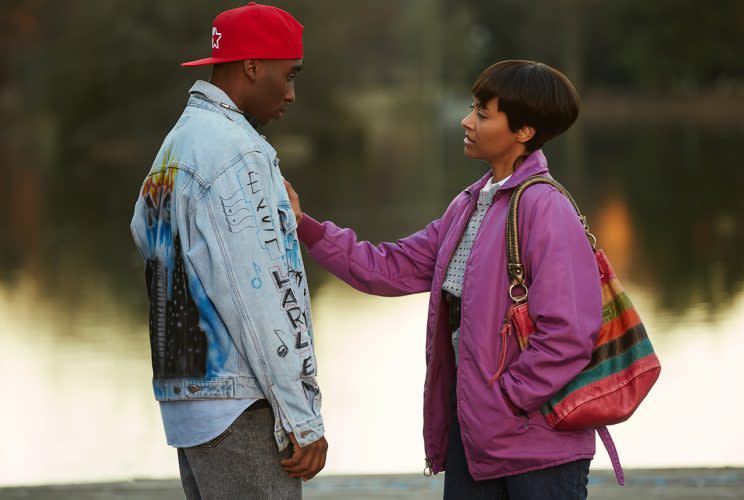
In that case, you’re making up dialogue and putting it into the mouths of real people. What was it like imaging how Jada Pinkett and Tupac might have spoken to each other?
Haft: I think it’s just the normal writing thing that we do for any character. Like we’ve said, certain things Tupac said are on YouTube. Other things, we just imagined where their head space was and what they were doing. There’s that scene where Tupac gets the lead in the school play, and we knew he and Jada were good friends in Baltimore and that Tupac was very, very, very confident in his acting and rapping ability even back then. So [that knowledge] informed the character; from doing that kind of research, we could construct the dialogue, showing that Tupac would be a little braggadocios and Jada would tease him about it.
Gonzalez: I believe there are four or five scenes with them. You see her busting his balls, for lack of a better word, early on after he gets the lead, and then later on, when he shows up on her set and they’re still going back and forth with that great banter. So when she confronts him at the House of Blues after he sings, ‘Hit ‘Em Up,’ and calls him out, it’s completely valid [dramatically] that she would come up and get in his face.
[Ed. note: On June 16, Jada Pinkett Smith posted a series of tweets about ‘All Eyez on Me,’ saying that “The reimagining of my relationship to Pac has been deeply hurtful.” ]
After Straight Outta Compton and now All Eyez on Me, what’s the next big hip-hop biopic that needs to be made?
Gonzalez: We would love to do a Public Enemy biopic. There are so many interesting people in that world, and I don’t want to shortchange anyone out there. But personally, a Public Enemy story would be fantastic. You can also go back to The Sugarhill Gang and “Rapper’s Delight,” which launched so many things. Whatever it is, I hope there are more movies like this that come out.
‘All Eyez on Me’: Watch a trailer:
Read more from Yahoo Movies:


